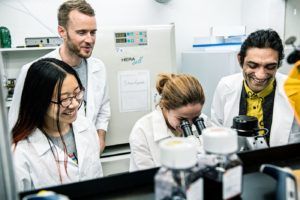New Age Meats — a Berkeley-based cultivated meat startup designing bioreactors to grow stem cell formulations into bacon or pork belly — has closed a seed round worth $2.7 million.
Leading the round is New York’s deep tech-focused investors ff Venture Capital. Other investors include UK-listed foodtech investor Agronomics, Sand Hill Angels, Supernode Ventures, Hemisphere Ventures, and Kairos Ventures. SOSV followed on from its pre-seed IndieBio accelerator investment in the startup.
Pork alternatives have been all the rage in 2020 so far, dominated by a triumphalist spectacle at the Consumer Electronics Show in Las Vegas, where Impossible Foods first lifted the lid on its new plant-based pork simulacra. This seed funding round of a cultivated protein producer, however, is a quieter but similarly salient reminder: plenty of investors still reckon plant-based is not the only alternative on the horizon, a view detailed in AgFunder’s recent White Paper on the future of proteins.
During an interview with AFN last week as the funding round came to a close, New Age Meats CEO and founder Brian Spears made the point that in the cultivated versus plant-based debate, he felt it makes more sense to find a fast and sustainable way to grow meat cells rather than to reformulate plant cells to mimic the traits of animal cells. Spears’ cultivated approach means transforming a sample of stem-cells into fat and muscle cells, and then growing them in a scaffold structure within a bio-reactor.
“We’ve made sausages in the past,” said Spears, whose company span out of London’s Entrepreneur First program before graduating from IndieBio’s accelerator program in San Francisco in 2018. Spears and his team started with sausages, he said, because sausages are an easier, mushier structure to grow — as compared to the more complex, sinewy biological architecture of a strip of bacon or a slab of pork belly.
Cultivating bacon

This reporter has heard parallel thoughts on the distinction between cultivating a beef burger patty versus a fillet of steak. The founders of Future Meat Technologies and Aleph Farms both stressed that point during recent interviews. For Aleph, underscoring this technical difficulty gave added dramatic effect to one of its more eye-catching morsels of news last year: the 3D-printing of some of its lab-grown cells into a tiny piece of beef steak in the International Space Station. (Back on earth, there are quite a few startups attempting 3D printing with plant-based ingredients. Among them are Israel’s Redefine Meat or Catalonia’s NovaMeat. The latter has just launched a new version of its 3D-printed steak alternative through micro-extrusion technology.)
For New Age Meats, there’s lots of thinking behind opting for pig stem cells rather than beef. On the scientific side, there is a wealth of existing biotech-related genome research on pigs. Much of that research has centered on xenotransplantation. To give one recent and drastic example in China, pigs have had their genes edited to grow the organs of humans or monkeys inside them as a possible future source for transplants. Until recently at least, cows have been spared much of that sort of scientific attention.
Besides biotech advantages, anything grown to replace pigs would be providing an alternative to the world’s most consumed form of protein. Pig farms globally, and especially in Asia, are under particular strain from the welfare and bio-security issues inherent in their tendency toward excessive intensity and an over-reliance on vaccines and antibiotics. Add to that a widening fallout from African Swine Fever, as I reported last year, and you have a major set of catalysts for a rethink on conventional pig farming.
Spear said that with the success of his company’s sausages, attention was now turning to pork belly and bacon, with an emphasis on what all cultivated meat companies are struggling with: cost reduction and scale. (Let’s leave a potentially arduous regulatory minefield and consumer wariness to one side for the time being.) It will pit New Age Meats in a pork race with companies like Meatable in the Netherlands, which aims to prototype its first lab-grown pork chop by this summer.
For both companies, getting anywhere close will require strong headway on a few scientific fronts at once. First, each will need to lean heavily on their “wet science” team — the biologists who understand cellular growth structures, cell nutrition, gene editing capabilities, and fermentation. And in tandem, they will both need to get cracking on the engineering side — hiring engineers who can get a handle on a process that has been developed in the biotech space, where cost of production was never as much of an issue. So that means developing ways to minimize the waste of expensive cell nutrients, keeping them growing safely and healthily.
Is this too much of the process for one startup to tackle? Not at all, reckons Spears. “At this point, it makes sense for us to focus on the full stack,” he said with determination. As the industry matures, he said, he might be more open to see where other companies can slot into their vertical integration to make life easier. One example of the opposite strategic approach is Canada’s Future Fields — a member of Rocket Seeder and AgFunder’s first Singapore GROWhort. Future Fields is focused on enabling this growing industry with one core piece of the puzzle from the outset and then partnering for the rest: it’s formulating and licensing plant-based alternatives to certain fetal serums that still often get used in the early stage of cell growth.
The all-out “full stack” approach to cultivation has got the nod from AJ Plotkin, a partner at ff Venture Capital, and his fellow investors. In a statement, he described how New Age Meats fits their focus on “transformative technologies and visionary founders (…) We are confident cultivated meat will be part of the food economy long term.”
What is your view on the cultivated versus plant-based debate? Let us know at [email protected]





